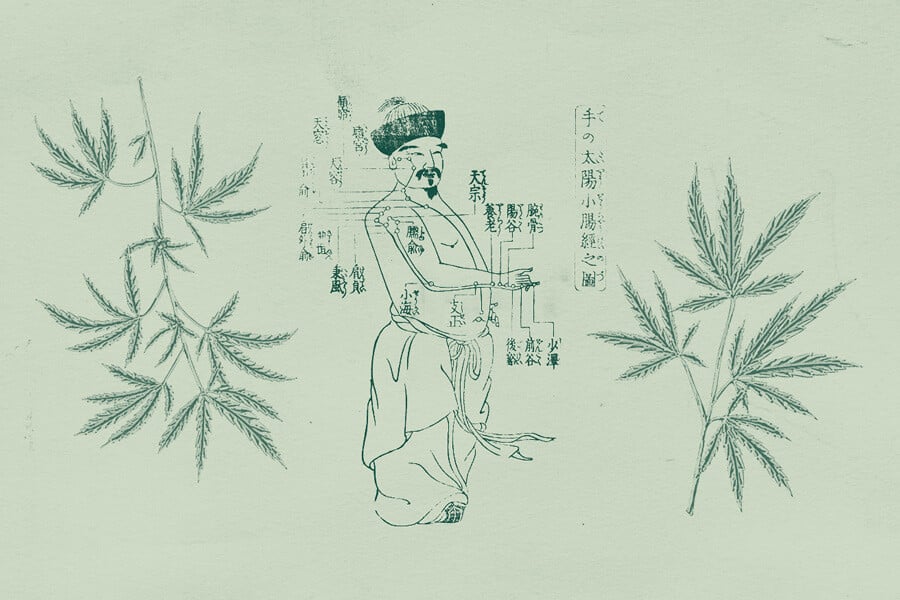.
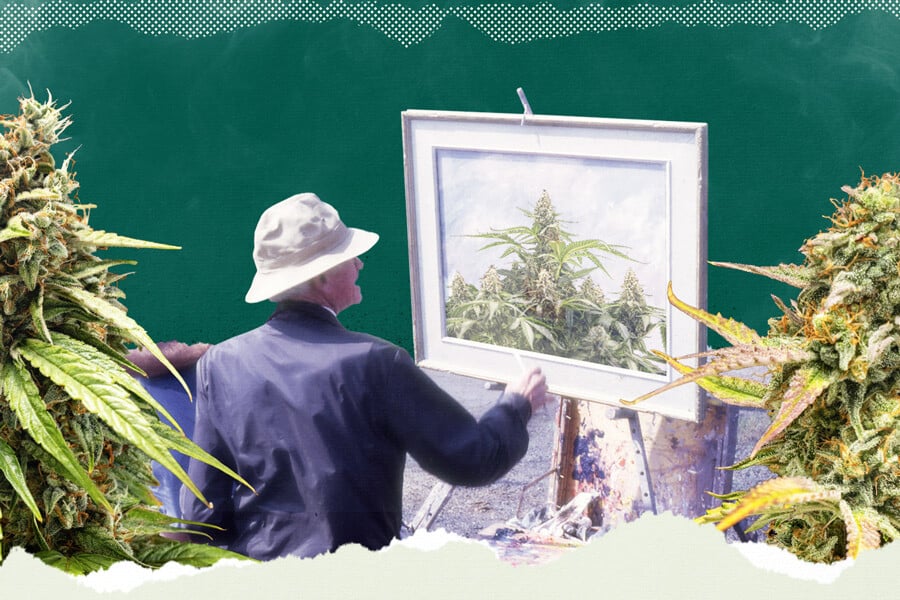
5 Weed-Inspired Artists You Need to Start Following
Do you use cannabis to get creative? You're not alone. Many creatives find weed's unique effects to be the perfect muse. Below, we shine a light on some of our favourite weed-loving artists and explore the topic of cannabis and creativity in more detail.
Contents:
For some, cannabis offers an ideal way to relax, unwind, and switch off. For others, the plant provides the perfect fuel to ignite their creative spark. From painters to musicians; from sculptors to dancers, there's no shortage of artists who openly use weed for creativity. Below, we shine a light on some of our favourite artists whose creative endeavours are enhanced or inspired by cannabis. Keep reading to learn who they are, and to learn more about the effects of cannabis on creativity in general—you might be surprised by what you read!


Can Cannabis Help With the Creative Process?
Among some proponents, cannabis' potential benefits on creativity are believed to stem from its ability to relax the body and mind, ease tension, and reduce inhibitions. However, this in itself is a very broad viewpoint. Thankfully, some researchers are now looking to discover if and how cannabis might enhance or otherwise support creativity.
In 2022, three researchers from the Foster School of Business, the University of Virginia, and the National University of Singapore conducted two studies[1] with a total of more than 300 cannabis users in Washington state (where cannabis is legal). The researchers made sure to include participants who didn’t use cannabis, as well as those who did. Surveys and drug tests confirmed that the regular tokers in the group used cannabis several times a week. The participants were then asked to perform several creative activities in their regular settings and, if they used weed, under the influence of the amount and type of cannabis they’d normally consume.
One of the activities, for example, was to come up with as many creative uses for a brick as possible. In the second study, the participants were asked a similar question—namely, to come up with as many ways as possible to help a local band increase its revenue. The answers to these questions were then passed on for Fevaluation by other study participants as well as a panel of subject matter experts and research assistants.
The study concluded that, in general, those participants who used weed were better-spirited. The authors described them as "happier, more cheerful, and, simply put, in a better mood”. In turn, they found their own ideas, as well as those of other participants, to be more creative. The sober participants, research assistants, and experts, however, found that the ideas from the "high" participants were no more creative than those of the non-high ones.
Now, are these findings conclusive? Of course not—scientific studies into cannabis rarely are. They do, however, make it clear that creativity is subjective; what might seem creative and innovative to one person might not to another. On the other hand, the study results say nothing about the “feeling” of being creative. People who appreciate cannabis’ buzz may feel more creative when using it, regardless of whether or not others agree. And that feeling may, in a more subjective and personal way, cause that individual to think and address problems or situations in unique, more creative ways.
Cannabis in the Historical Context of Art
Regardless of whether science confirms that cannabis increases creativity or not, one thing's clear—creative people have long turned to cannabis and other intoxicating substances to fuel the flow of ideas. In fact, some of the earliest representations of weed appear in art. The earliest written mention of cannabis, for example, is the Chinese character “ma” (麻), which means “hemp” and dates from 3000 BCE. Many scholars believe the character is actually an illustration[2] of hemp plants being hung to dry under a shelter. Earlier than that, cannabis also appeared in neolithic Japanese cave paintings.
Cannabis also makes many appearances in ancient Hindu art, which often depicts the god Shiva, as well as humans, consuming weed, usually in the form of bhang—a potent weed-infused drink still consumed throughout India today.
After spreading from Asia to the Arab world, cannabis was adopted across most of Europe by the end of the Middle Ages. By the 19th century, it was openly consumed by Paris’ Club des Hachichins ("Club of the Hashish-Eaters"), whose members and/or visitors included writers like Alexandre Dumas, Victor Hugo, Charles Baudelaire, Eugène Delacroix, and more.
More modern examples of cannabis’ ties to the art world include the beat poets of the 1950s and the music of the 1960s and 1970s counterculture movements. From the writings of Kerouac, Ginsberg, and Burroughs to the mysterious layers of The Beatles' "I Am The Walrus", art from the mid to late 20th century is brimming with cannabis’ undeniable influence.


What Are Common Themes Found in Weed-Inspired Art?
Cannabis art can take many forms, from surrealist prose to psychedelic rock and colourful paintings. Of course, one could argue that every artwork is uniquely influenced by the experiences of the individual(s) who made it. At the same time, cannabis-inspired art also often shares common themes, including:
- Surrealist interpretations of “real” subject matter
- Religious themes
- Psychedelic elements
- Justice and morality
- Activism
-
Cannabis and Flow States in the Creative Process
As you’ll know from reading other RQS blog articles, we’re firm believers that the cannabis experience is extremely subjective—no two people are the same, and hence everyone’s experience of weed is unique. By extension, the way this ancient plant affects a person’s creativity is just as subjective. However, we do think that, based on anecdotal reports, cannabis’ potential to enhance creativity lies, at least in part, in its ability to disinhibit the creative process.
As we’ve mentioned (and you’ve likely experienced yourself), cannabis can be very relaxing, sometimes to the point of sending us to sleep. However, the right dose of the right strain can provide just the right amount of relaxation so that you’re free from tension, without being drowsy. Ever taken a few puffs from a joint and felt that ideas and conversation seemed to flow with ease, almost like the hinge of a door you just sprayed with WD-40? That’s what we’re talking about—that’s where, for cannabis-loving artists, the magic happens.
Under this spell, you might spend less time analysing an idea or project—instead, the ideas will flow and take new forms, leaving you inspired and ready to creative. Before you know it, a chord on a guitar, a colour on a palette, or a single word on a page might open up a world of opportunities that you’ll eagerly explore.
-
Artistic Rituals From Cannabis Artists
Besides putting some people into a flow state, cannabis may also help artists connect with their creative outlet by providing a kind of ritual. Lighting up an hour or two before getting to work, perhaps as they are setting up their space, can serve as a practice that helps artists set the creative cogs in motion.
5 Artists Inspired by Cannabis
Ready to see cannabis’ creative power in action? Check out the work of these weed-loving artists.
-
Chris Burden
Chris Burden is a renowned US artist known for his controversial and often dangerous installations, many of which strikingly endangered his safety. Examples include 1977's Shoot, which featured Burden being shot in the arm by an assistant with a 0.22-calibre rifle, 1972's 747, in which Burden fired multiple shots at a Boeing 747 leaving Los Angeles International Airport, and 1974's Trans-Fixed, in which Burden was nailed to the top of a Volkswagen Beetle on Speedway Avenue in Venice, California.
In 1978, Burden joined the UCLA art department. That same year, he flew two joints across the US–Mexico border using rubber band-powered toy airplanes as part of his piece “Coals to Newcastle”, named after a British idiom describing a pointless act. The planes he used had phrases inscribed on them, such as "fumen los muchachos" (“smoke 'em boys"), and the entire event was documented by one of Burden's students.


-
Melanie Bernier
Melanie Bernier is a musician, artist, and professor at Virginia Commonwealth University. Besides making high-energy punk music, Bernier also makes weed-inspired fibre-based sculptures. After living with cannabis dealers, she became fascinated with cannabis' transition into the US mainstream and, particularly, what that might mean for "goofy weed culture". And it didn't take long for her newfound interest to permeate her art.
First she created Joints, a collection of hyper-realistic weed buds and joints sculpted from fabric and other fibres. As she delved deeper into the dilemma of cannabis legalization and its effect on cannabis culture, Bernier followed up with Colours, a collection of fictional government-approved cannabis cigarette packets embroidered with ratios and numbers—a statement about the possible loss of cannabis culture as it transitions from the underground into another booming US industry.


-
Fred Tomaselli
Fred Tomaselli is a US artist who creates profound realms that occupy both earthly and cosmic spaces—not hard to imagine, given he was born into Southern California's surf culture. His paintings are known to be large, extremely colourful, and often incorporate unique materials, such as wood panels and thick coats of epoxy resin. Beneath the many layers of Tomaselli's work, you'll find many renderings of pills and cannabis leaves. But his most pro-weed piece is, without a doubt, Super Plant, which features a huge cannabis plant with deep roots and reaching branches.
Besides its ties to both Eastern mysticism and Americana (through its likeness to Rajasthani miniatures and the Shaker tree of life), Tomaselli considers the piece a depiction of art history—as he does most of his work, due to its mixed materials and influences.


-
Ricardo Cortés
Ricardo Cortés is an illustrator best known for his work illustrating two successful tongue-in-cheek adult books. The first is Go the Fuck to Sleep, a bedtime story for adults written by Adam Mansbach and read by actor Samuel L Jackson. The second is I Don't Want to Blow You Up, a colouring book devoted to famous Muslims (11 real, two fictional) who are not terrorists.
In 2005, Cortés followed up with his now most famous work: It's Just a Plant, a children's book for parents who want to educate their kids about cannabis. Though the book stirred up some controversy, particularly among conservative policymakers and pundits, It's Just a Plant received generally favourable reviews, including by the New York Post, who called it "a riot".

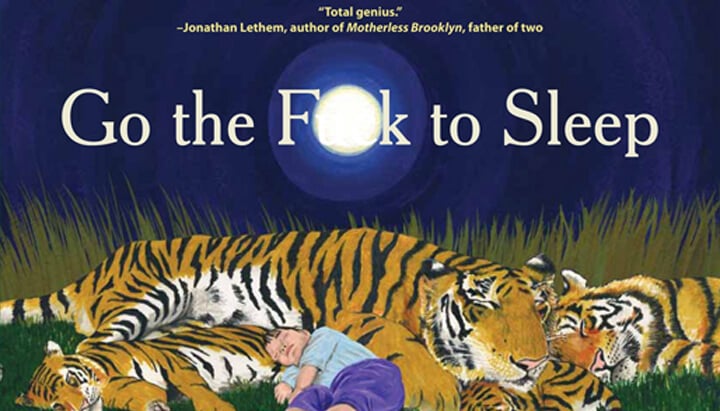
-
Dan Colen
Dan Colen is a New York City-based visual artist who is known to employ traditional oil painting as well as the use of all kinds of unique materials. His piece Secrets and Cymbals, Smoke and Scissors (My Friend Dash's Wall in the Future), for example, is made up of snapshot photos and recreates the apartment of one of Colen's friends, the late artist and photographer Dash Snow.
Life Marijuana, on the other hand, explicitly features cannabis in the form of the October 1969 Life Magazine cover, which features an unknown subject smoking a joint. Another similar piece, This Is Addictive, reimagined many popular vices as elements of the periodic table.
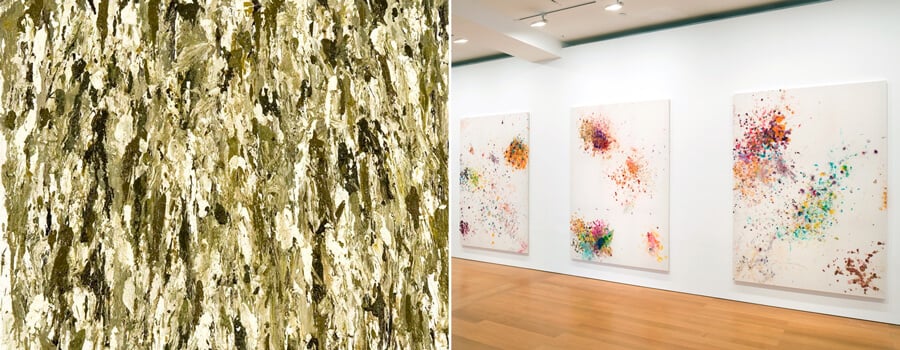
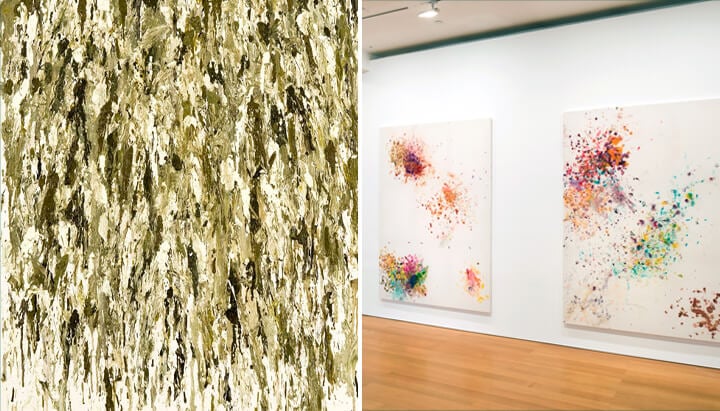
The Ethics and Stigma Around Using Cannabis for Creativity
If you were a cannabis smoker during the latter half of the 20th century, chances are you would have kept your herbal habit to yourself, no matter how beneficial you found it to be. Today, however, that's completely changed. Despite still being illegal in many parts of the world, smoking cannabis is nowhere near as taboo as it used to be. In fact, it's now commonplace for people to openly admit their love for weed.
Whereas cannabis was once rumoured to kill brain cells, cause cancer, and even make people crazy, today its relaxing, uplifting, and even energising effects are thought to have a plethora of benefits, especially for the creative process. From rappers like Snoop Dogg and Wiz Khalifa to comedians and actors like Sarah Silverman and Seth Rogen, and even business leaders like the late Steve Jobs—there's no shortage of highly successful creatives out there who swear by weed as a muse. As the legalization movement continues to grow, hopefully we'll see the stigma around cannabis disappear.
Brush in One Hand, Joint in the Other
Artists and creatives have long looked to intoxicating substances for inspiration. And cannabis has remained at the forefront of the lineup, providing writers, painters, sculptors, dancers, musicians, and even highly successful entrepreneurs with the perfect buzz to stay sharp. In fact, archaeological evidence suggests that some depictions of cannabis in visual art date as far back as 5000 BCE. Today, as legalization continues to evolve and the opinions and laws surrounding cannabis change, we suspect more people from all walks of life will open up about using cannabis for creativity.
- Research: Does Cannabis Really Make You More Creative? https://hbr.org
- Ma-Ren_Hua https://www.drscottjay.com






























